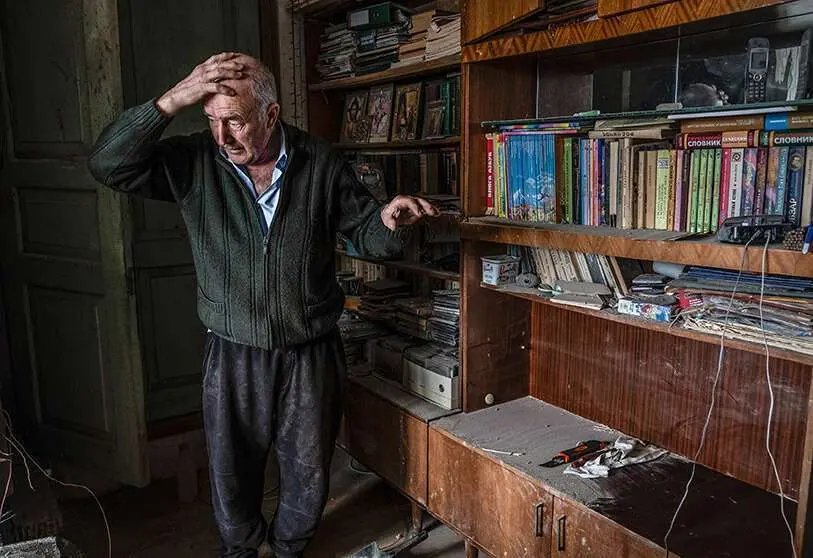Mikolaiv resiste bajo las bombas, impidiendo el avance de las tropas rusas hacia Odesa

Maria Senovilla, from Mikolaiv (Ukraine)
"The projectile went through the roof, made this hole in the middle of the hall and fell into the basement," says Vladimir with desolation on his face. A broom crossed over the gaping hole in the floor serves as a warning against falling through an oversight. Dust covers everything, window panes are smashed and books that have fallen off the shelves in the shock of the bombing are piled up in a corner.
Khersonska Street is a jumble of rubble from beginning to end. The frames of houses peep through gaps in the roofs of this residential neighbourhood, known in Ukraine as a 'private sector'. In some houses, men are covering the windows, now without glass, with plastic sheeting. In others, there is only silence. "Two people died in number 23," says Vladimir, staring up at the roof of his home, now cracked by a bomb that fell from the sky as they slept.

Vladimir's is not the only street to have perished under Russian fire in the port city of Mikolaiv, known for having one of Europe's largest shipyards, and with a population of around half a million before the war broke out. Just yesterday, another brutal artillery attack left nine dead and more rubble in this enclave.
"Bombs have not stopped falling in Mikolaiv Oblast since 24 February; there has been artillery fire every day," says the spokesman for the province's Military Territorial Office.
With three battle fronts open at the gates of the city, Ukrainian troops are employing a "pocketing" manoeuvre to contain the Russian advance. "A few hours ago we surrounded one of the enemy's four columns", says the spokesman, "and in the next few hours we will reduce it completely".

This would give some breathing space to Odessa, where alarms were raised last week over the threat of an amphibious landing on its shores (a strategy that would have been somewhat far-fetched without ground troops who, after taking Mikolaiv, would advance to the Pearl of the Black Sea to support the Russian ships).
For the moment, Russian troops are contained outside the city. And it is possible that, if they succeed in taking Mikolaiv, the Ukrainians could blow up the huge bridge over the Bug River that serves as an access road to the city, which would open the way to Odessa. The other alternative for Putin's army to advance without being able to cross the bridge would be via the railway crossing far to the north, which would slow down the passage of armoured vehicles and would be a significant drain on resources.
The soundtrack in this Ukrainian town has for the past 19 days been the sound of anti-aircraft sirens and mortar shells. According to military sources, many of the shells are launched from the Kherson region, 70 kilometres away.

But the Russian forces also have three mechanised battalions - after the Ukrainian army managed to reduce a fourth over the weekend. This amounts to a total of more than 300 vehicles and 2,400 troops positioned within a few kilometres of Mikolaiv airport. Russian airborne forces are also present in the northern part of the Oblast. This could intensify in the coming days.
In addition, aircraft taking off from Crimea are reportedly dropping FAB-250 bombs, which have hit the villages near Snigirevka and Senkevich, as well as the towns of Ochakiv and Mikolaiv, in the last few days.
Although analysts are surprised at Putin's limited use of air capabilities in this war, aircraft attacks are present in Mikolayev province. And among the targets they hit are civilian buildings and houses, and even schools (fortunately closed since the offensive began).

Yesterday, Sunday, the head of the Mikolaiv Regional State Administration, Vitaly Kim, expressed in a statement his concern about the seriousness of the attacks, which are directed at the civilian population, and assured that "what is happening is deliberate". He joined the voices denouncing war crimes due to the indiscriminate nature of the targets being bombed.

The UN human rights office has also warned the Russian authorities that "any targeting of civilians and civilian infrastructure, the bombing of towns and villages and other forms of indiscriminate attacks are prohibited under international law".








